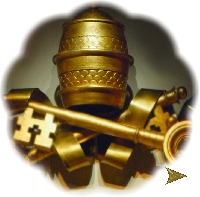 Peter, the Rock and the Papacy The New Testament provides us with enough evidence that Peter was first in authority among the Apostles to fix it as a certainty. Whenever they were named, Peter headed the list (Matt. 10:1-4, Mark 3:16-19, Luke 6:14-16, Acts 1:13); sometimes it was only "Peter and his companions" (Luke 9:32). Peter was the one who spoke for the Apostles (Matt. 18:21, Mark 8:29, Luke 12:41, John 6:69), and he played a decisive role in many of the most dramatic scenes (Matt. 14:28-32, Matt. 17:24, Mark 10:28). It was Peter who first preached to the crowds on Pentecost (Acts 2: 14-40); Peter worked worked the first healing (Acts 3:6-7); and significantly, it was to Peter that the revelation came that Gentiles were to be Baptized (Acts 10:46-48). From the very onset of Christ calling the Apostles Peter was shown to hold a preeminent position among them although the signs were given gradually. At their first meeting, Christ told Simon that his name would thereafter be Peter, which translates as Rock (John 1:42). The amazing thing was that in the Old Testament only God had called a rock, until now. The word was never used as a proper name for a man. So the Apostles had to take note of this momentous event and ask why Peter for Simon, why give him as a name that had only been used for God before this? THE SIGNIFICANCE OF THE BESTOWAL OF NEW NAMES It is an axiomatic truth that Christ was not given to meaningless gestures, and neither were His fellow Jews as a whole when it came to names. The bestowing of a new name meant that the status of the person was changed, as when Abram was changed to Abraham (Gen. 17:5), Jacob to Israel (Gen. 32:28), as we have already taken note of. But no Jew had ever been called Rock because that was reserved to God. The Jews would give other names taken from nature, such as Barach [which means lightning but no Rock. In the New Testament James and John were surnamed Boanerges, Sons of Thunder, by Christ, but their original names remained in usage. However, Simon's new name supplanted the old. No one of the Apostles complained of Simon being singled out for this honor because they understood at once and thus from that time on Simon is called by his new name while James and John remain just James and John, not Boanerges. When He first saw Simon, "Jesus looked at him closely and said, Thou art Simon the son of Jonah; thou shalt be called Cephas (which means the same as Peter)" (John 1:42). Later, after Peter and the others had been with Christ for some time, they went to Caesarea Philippi,. This was the place where Peter made his profession of faith: "Thou art the Christ, the Son of the living God" (Matt. 16: 17). Jesus told him that this truth was especially revealed to him, and then He re-emphasized: "Thou art Peter" (Matt. 16:18). Then he gave the Divine promise that the Church that would be founded would, in some way, be founded on Peter (Matt. 16:18). Now we must look at two very significant truths that were told to Peter. First, "Whatever thou shalt bind on earth shalt be bound in Heaven; whatever thou shalt loose on earth shalt be loosed in Heaven" (Matt. 16: 19). There is no missing that Peter was designated the authority that provides for the forgiveness of sins and the making of disciplinary rules. After a time the other Apostles would be given similar power, but here Peter received it in a special way. Second, Then Peter alone was promised something else. "I will give to thee [singular] the keys to the kingdom of Heaven" (Matt. 16: 1.9). In those days keys were the literal hallmark of authority as they are still somewhat symbolically today. Cities were walled, often with but one great gate and that gate one great lock worked by one great key. To be given the key to the city meant to be given ready access to and authority over the city. The city to which Peter was given the keys was the heavenly city itself. Keys are used elsewhere in the Bible such as in Isaiah 22: 22: "And I will lay the key of the house of David upon his shoulder: and he shall open and none shall shut: and he shall shut and none shall open." A foreshadowing of Peter and his authority. When Jesus appeared to His disciples after the Resurrection, He asked Peter three times, "Dost thou love me?" (John 21:15-17). In expiation for his threefold denial, Peter gave a threefold affirmation of love. Then Christ, Who is the Good Shepherd (John 10:11,14), gave Peter all the authority He earlier promised:-- --Feed my sheep" (John 21:17) bringing the prediction made just before Jesus and his followers went for the last time to the Mount of Olives to full circle. Immediately before his denials were predicted, Peter was told,---Simon, Simon, behold, Satan has claimed power over you all, so that he can sift you like wheat; but I have prayed for thee [singular], that thy faith may not fail; when, after a while, thou hast come back to Me [after the denials], it is for thee to be the support of thy brethren" (Luke 22:3 1-32). It was Peter that Christ prayed would have faith that would not fail and that would be a guide for the others, and His prayer, being perfectly infallible, was sure to be fulfilled. VIEW AN IMAGE OF ST. PETER RECEIVING THE KEYS FROM CHRIST FORWARD FOR PART 6.  Contact-Us Contact-Us HOME----------------------------TRADITION www.catholictradition.org/Tradition/peters-primacy5.htm |